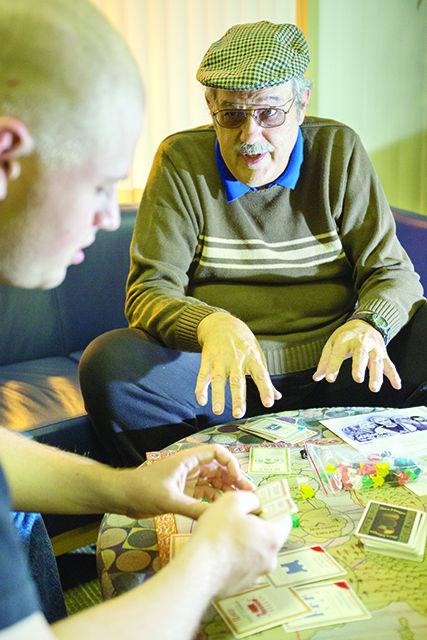Pulling a dolly full of games with him as he walked inside Witherspoon Student Center, game designer Lewis Pulsipher, or “Lew,” is a regular member of NC State’s Table Top Gaming Club. The 64-year-old man has been testing games of his own design with the NC State Table Top Gaming Club students for more than eight years.
At the last club meeting on Friday, Pulsipher spoke about tabletop gaming with an undeniable sense of passion and knowledge, rattling off names of game publishers and games off the top of his head with ease. Pulsipher has a long history with the craft, from his early days of trying to get his first games published to being the first person to teach college game design classes in North Carolina in 2004.
“I’m the longest attending member [of Table Top Gaming Club] other than the founder,” Pulsipher said. “I’ve had games that have been played many times here.”
Pulsipher drives nearly 50 miles each way from his home near Fayetteville every Friday to meet with NC State’s Table Top Gaming Club so he can have students test his games, a process that allows him to see how players interact with his games in different ways to make sure the games are fair.
“Lew has been with the club since before I was a member,” said Andrew Johnson, a senior studying material science and president of the Table Top Club. “Tabletop games are something he’s very passionate about, which one can easily tell from the sheer amount of games he’s both made and gotten published. He’s rarely missed a meeting and always has a group of players excited to play what he brings every week.”
Pulsipher has published a half a dozen board games during his career, including the incredibly popular war game Britannia. The game follows the various wars and migrations surrounding the island of Great Britain from the Roman invasion to the Norman Conquest. It is ranked in the top 400 games by members on the site Board Game Geeks among a list of more than 10,000 games.
Pulsipher said his interest in game design started at a young age. As a child, he would create games by playing with toy tanks. Pulsipher then moved on to games that encouraged modification, specifically Diplomacy or Dungeons & Dragons. Pulsipher said these games were his training of creating his own games.
Pulsipher made it clear just how much of an effect tabletop gaming has had on his life during the years, with the hobby even playing a pivotal role in how he met his wife.
“I was contacted through a game shop by someone from the University of London who wanted to learn how to play D&D [Dungeons & Dragons],” Pulsipher said. “I went down to London to teach four people. In the end, I married one. Another married my wife’s best friend. The other two married one another, although they weren’t attached to each other at the time, and we’re all still married 36 years later. Pretty efficient!”
Pulsipher has never designed games as a full-time job, stating that “almost nobody makes a living in freelance [game design]; I certainly don’t.”
Pulsipher graduated from Duke University with a Ph.D. in military and diplomatic history. He then taught himself computer programming. He has taught at colleges including Webster University, Wake Technical Community College and Central Carolina Community College on the subjects of computer networking, web design and game design.
As the game developer spoke effortlessly about these subjects for more than an hour, he would beat on the table in front of him in excitement. By the time Pulsipher was done talking, he had formed an audience of students.
Occasionally, one student would chime in, and Pulsipher would immediately engage with him or her in an even more in-depth discussion. Pulsipher could quickly jump from discussing what he referred to as the “baby-boomer hobby” of war games to a series of different subjects such as chess, the history of Britain, teaching and video games, each subject spoken with the same enthusiasm as the last.
However, no matter the subject of discussion, Pulsipher always managed to bring things back to gaming.
“I’m a what-happens-next guy,” Pulsipher said. “History is all about what happens next. In the end, what is important is why it happened, but first of all you’ve got to know what happened. In the games I design, things happened that nobody ever saw before even though they’ve been playing for a while.”
After finishing the hour-long discussion, Pulsipher immediately went to work testing his newest game, God’s Will, a card game where players fight over worshipers as a Greek god or goddess, and the student audience stayed circled around him to play.








